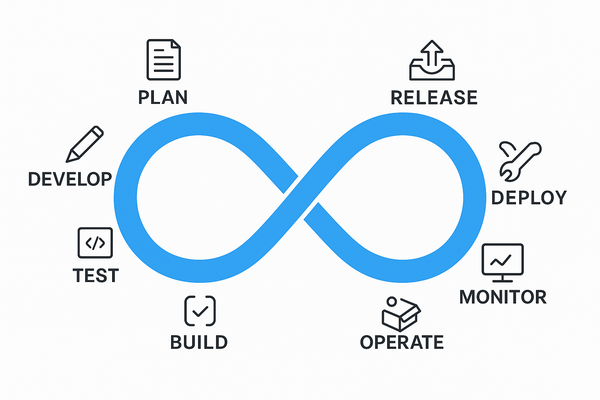DevOps is a combination of cultural philosophies, automation practices, and collaboration tools that help teams release software faster and more reliably. This shift has created massive demand for DevOps engineer jobs across industries.
Introduction: What is DevOps & Why DevOps Engineer Jobs Are in High Demand
DevOps = Development + Operations working together using automation, cloud tools, and continuous delivery.
How DevOps Works in Real Life
Traditionally, developers write code, and operations teams deploy it. In DevOps, all teams — including development, operations, QA, and security — collaborate throughout the software lifecycle:
Develop → Test → Deploy → Monitor → Improve
This DevOps model enables faster delivery, fewer bugs, and smoother scaling.
Why DevOps Engineer Jobs Are in High Demand
With everything going digital — banking, shopping, entertainment — companies must release high-quality apps faster. DevOps helps them:
- Deliver features quicker
- Reduce production bugs
- Improve customer satisfaction
- Use cloud infrastructure efficiently
Key Benefits of DevOps (Especially for DevOps Engineer Jobs)
| Benefit | Description |
|---|---|
| Speed | Faster feature delivery than competitors |
| Rapid Delivery | Frequent updates with automation |
| Reliability | Fewer bugs, thanks to testing & monitoring |
| Scalability | Easily handle thousands of users or systems |
| Collaboration | Improved communication between teams |
| Security | Automated security checks ensure compliance |
🔑 Core DevOps Practices You Must Know
1️⃣ Continuous Integration (CI)
Developers push code frequently, triggering automated tests.
Tool Example: AWS CodeBuild
2️⃣ Continuous Delivery (CD)
Deploy changes to production without manual steps.
Tool Example: AWS CodePipeline
3️⃣ Microservices
Break apps into independent components.
Tool Example: AWS Lambda, ECS
4️⃣ Infrastructure as Code (IaC)
Use code to define your cloud infrastructure.
Tool Example: AWS CloudFormation
5️⃣ Configuration Management
Keep systems consistent using automation.
Tool Example: AWS Systems Manager
6️⃣ Policy as Code
Apply security rules via code to enforce compliance.
Tool Example: AWS Config
7️⃣ Monitoring & Logging
Track system health and get alerts.
Tools: Amazon CloudWatch, AWS CloudTrail
8️⃣ Collaboration Tools
Coordinate work across teams using Jira, Slack, or Confluence.
Popular AWS DevOps Tools You’ll Use
| AWS Tool | Purpose |
|---|---|
| CodeCommit | Git-based source control |
| CodeBuild | Code compilation & testing |
| CodeDeploy | Automated deployments |
| CodePipeline | CI/CD workflow automation |
| CloudFormation | Infrastructure as code |
| CloudWatch | Monitoring & alerts |
| Systems Manager | Configuration management |
Explore all AWS DevOps Services →
How to Start Your DevOps Career on AWS
- Create a Free AWS Account
- Build a basic pipeline with CodeCommit + CodePipeline
- Use CloudFormation to write IaC in YAML or JSON
- Monitor your app with CloudWatch alarms and logs
Final Thoughts for DevOps Engineer Job Seekers
DevOps isn’t just tools — it’s a culture. It empowers engineers to:
Work together
Deliver faster
Fail safely
Continuously improve
Whether you’re a fresher, backend developer, or sysadmin, DevOps engineer jobs can take your career to the next level.
Next Steps
- Follow our DevOps tutorials
- Explore more DevOps engineer career guides
- Subscribe to InsightClouds for weekly updates
